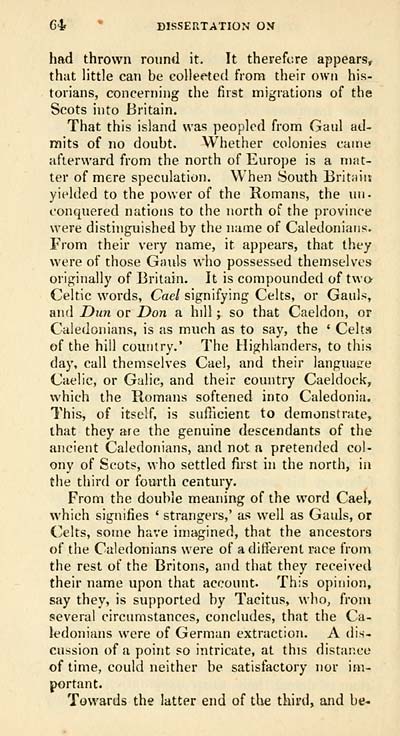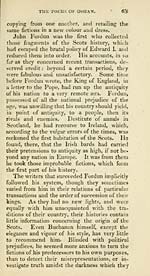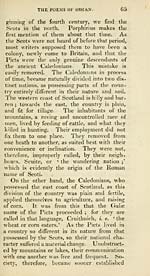Ossian Collection > Poems of Ossian
(76)
Download files
Complete book:
Individual page:
Thumbnail gallery: Grid view | List view

C4r ' DISSERTATION OS
had thrown round it. It therefore appears^
that Httle can be colleetcd from their own his-
torians, concerning the first migrations of the
Scots into Britain.
That this island was peopled from Gaul ad-
mits of no doubt. Whether colonies came
afterward from the north of Europe is a mat-
ter of mere speculation. When South Britfiiii
yielded to the power of the Romans, the un-
conquered nations to the north of the province
were distinguished by the name of Caledonians.
From their very name, it appears, that they
were of those Gnuls who possessed themselves
originally of Britain. It is compounded of two
Celtic words, Cael signifying Celts, or Gauls,
and Dun or Don a hill ; so that Caeldon, or
Caledonians, is as much as to say, the ' Celts
of the hill country.' The Highlanders, to this
day, call themselves Cael, and their language
Caelic, or Galic, and their country Caeldock,
which the Romans softened into Caledonia.
This, of itself, is sufHcient to demonstrate,
that they are the genuine descendants of the
ancient Caledonians, and not a pretended col-
ony of Scots, who settled first in the north, in
the third or fourth century.
From the double meaning of the word CaeK
which signifies ' strangers,' as well as Gauls, or
Celts, some have imagined, that the ancestors
of the Caledonians were of a ditferent race from
the rest of the Britons, and that they received
their name upon that account. This opinion,
say they, is supported by Tacitus, who, from
several circumstances, concludes, that the Ca-
ledonians were of German extraction. A dis-
cussion of a point so intricate, at this distance
of time, could neither be satisfactory nor im-
portant.
Towards the latter end of the third, and be-
had thrown round it. It therefore appears^
that Httle can be colleetcd from their own his-
torians, concerning the first migrations of the
Scots into Britain.
That this island was peopled from Gaul ad-
mits of no doubt. Whether colonies came
afterward from the north of Europe is a mat-
ter of mere speculation. When South Britfiiii
yielded to the power of the Romans, the un-
conquered nations to the north of the province
were distinguished by the name of Caledonians.
From their very name, it appears, that they
were of those Gnuls who possessed themselves
originally of Britain. It is compounded of two
Celtic words, Cael signifying Celts, or Gauls,
and Dun or Don a hill ; so that Caeldon, or
Caledonians, is as much as to say, the ' Celts
of the hill country.' The Highlanders, to this
day, call themselves Cael, and their language
Caelic, or Galic, and their country Caeldock,
which the Romans softened into Caledonia.
This, of itself, is sufHcient to demonstrate,
that they are the genuine descendants of the
ancient Caledonians, and not a pretended col-
ony of Scots, who settled first in the north, in
the third or fourth century.
From the double meaning of the word CaeK
which signifies ' strangers,' as well as Gauls, or
Celts, some have imagined, that the ancestors
of the Caledonians were of a ditferent race from
the rest of the Britons, and that they received
their name upon that account. This opinion,
say they, is supported by Tacitus, who, from
several circumstances, concludes, that the Ca-
ledonians were of German extraction. A dis-
cussion of a point so intricate, at this distance
of time, could neither be satisfactory nor im-
portant.
Towards the latter end of the third, and be-
Set display mode to: Large image | Transcription
Images and transcriptions on this page, including medium image downloads, may be used under the Creative Commons Attribution 4.0 International Licence unless otherwise stated. ![]()
| Early Gaelic Book Collections > Ossian Collection > Poems of Ossian > (76) |
|---|
| Permanent URL | https://digital.nls.uk/77573702 |
|---|
| Description | Selected books from the Ossian Collection of 327 volumes, originally assembled by J. Norman Methven of Perth. Different editions and translations of James MacPherson's epic poem 'Ossian', some with a map of the 'Kingdom of Connor'. Also secondary material relating to Ossianic poetry and the Ossian controversy. |
|---|
| Description | Selected items from five 'Special and Named Printed Collections'. Includes books in Gaelic and other Celtic languages, works about the Gaels, their languages, literature, culture and history. |
|---|

